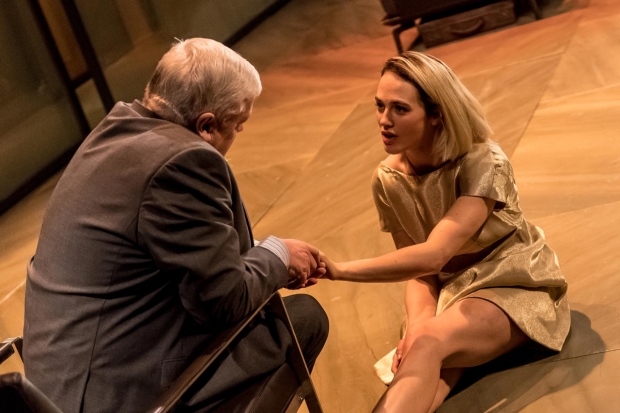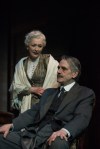Supporting performances can mean as much as star turns
After Andrew Scott paid tribute to his co-stars in his acceptance speech for the Critics’ Circle Award, Matt Trueman looks at why we need to champion the supporting role more

© Manuel Harlan
Picking up his Critics' Circle Award yesterday – his Hamlet was named Best Shakespearean Performance – Andrew Scott shared the praise around. "The chief achievement of Rob [Icke’s] production was the freshness with which it approached the other characters," he said, with genuine modesty – and he was right. His was, indeed, a heartfelt Hamlet, who made old, oft-quoted words feel like fresh-minted thoughts, but it was the reality of the world around him that really impressed.
That’s great direction, but it relies on great acting. Everyone on that stage re-examined their roles, most of which are much harder to make one’s own than the main part. "Sometimes", Scott continued, "you focus too much on the central character." Not here, we didn’t. In fact, my own vote – without taking anything away from Scott’s success – went to Jessica Brown Findlay, far and away the best Ophelia I’ve seen. She was, for once, absolutely her own woman; stern with Hamlet but never needy or shrill. Rather than spiral up and away into madness, she seemed to shrink into herself and snap. Kate Kellaway put it best: she "made something fluent out of the fragmentation of madness".
When we talk of great acting, we invariably mean leads. It’s not just that acting awards go to those that get to grips with the biggest, juiciest roles, it’s that we assume the best actors play the best parts. "Want to win this award?" asked critic Henry Hitchings, presenting Scott with his prize, "Play Hamlet". If you’re too old, try Lear.
Leading roles aren’t the most interesting, let alone the most demanding, parts in a play
It’s true – and these are great roles for good reason. They demand a lot of any actor, but, in equating them with great acting, we limit our appreciation of the actor’s art. We align it with stamina, marveling at actors who don’t leave the stage or learn all those lines. It risks becoming a macho feat – something that takes balls – or a display of transformative talent. We talk about carrying a show as if acting were an exercise in charisma alone.
It can be – witness Bryan Cranston’s darting, unpredictable performance that held Network together at the National – but the joy of acting is in its variety. It takes all sorts of people to play all sorts of parts.
Leading roles aren’t the most interesting, let alone the most demanding, parts in a play. Victoria Hamilton may have been mightily affecting in Albion – a grieving mother funneling her pain into a pet project – but I’d hedge that Helen Schlesinger had the harder job. As a louche, lesbian novelist – the spirit animal of the liberal elite – she had to be predatory, pompous and patronising without ever letting our sympathies slip. She stalked the garden like a lioness with a thorn in her paw: outwardly majestic, but, deep down, still wounded. In a risky old role, she was riveting. Few actors could have pulled the feat off.
In supporting roles actors tend to get less to work with
There is, of course, a skill to supporting performances. Actors tend to get less to work with, both in the script and on the stage. They’ve less time to win the audience over, and fewer opportunities to make a lasting impression. Some will slot into a show, others will steal off with it and yes, there’s a place for both those things. That word support is key too: there’s huge generosity in deferring to someone else, propping them up and providing what they need. The best actors can do that without getting lost.
It’s one of the reasons I love the Clarence Derwent Award – and it’s a pleasure to have joined the judging panel this year. Dating back to 1948, it sets out to celebrate the best supporting performances, one male and one female, without letting big stars get in the way for once. Look down the list of past winners and there are some extraordinary actors: Adrian Scarborough, Sophie Thompson, Michael Bryant, Linda Bassett. They’re all capable of playing leads in themselves – indeed, some of our greatest stage stars, from Judi Dench to Ian McKellen, have Clarence Derwent awards – but most do their best work to one side of the spotlight. They may not put bums on seats like the big names, but they are the stalwarts that keep the theatre propped up.
They are the stalwarts that keep the theatre propped up
This year’s winners prove the strength of that support – and, more than that, the range of what great acting can be. It might be the aching vulnerability Kate O’Flynn brought to The Glass Menagerie, a wallflower so shrunken she seemed to speak with a squeak, or the supreme, scenery-chewing chutzpah Jonjo O’Neill shot through Anthony Neilson’s Unreachable as the untameable, uproarious brute. Sometimes, you’ll see an actor disappear into a role – and Peter Polycarpou did just that in Oslo, completely, consistently convincing throughout. Sometimes, they’ll shine right out the other side: see the luminous Sheila Atim, who stalked through Les Blancs with still poise and lit up the Donmar’s Tempest as a knock-kneed, jaw-dropping Ferdinand.
Supporting performances can mean as much as star turns. There’s much more to acting than giving good Hamlet.

















